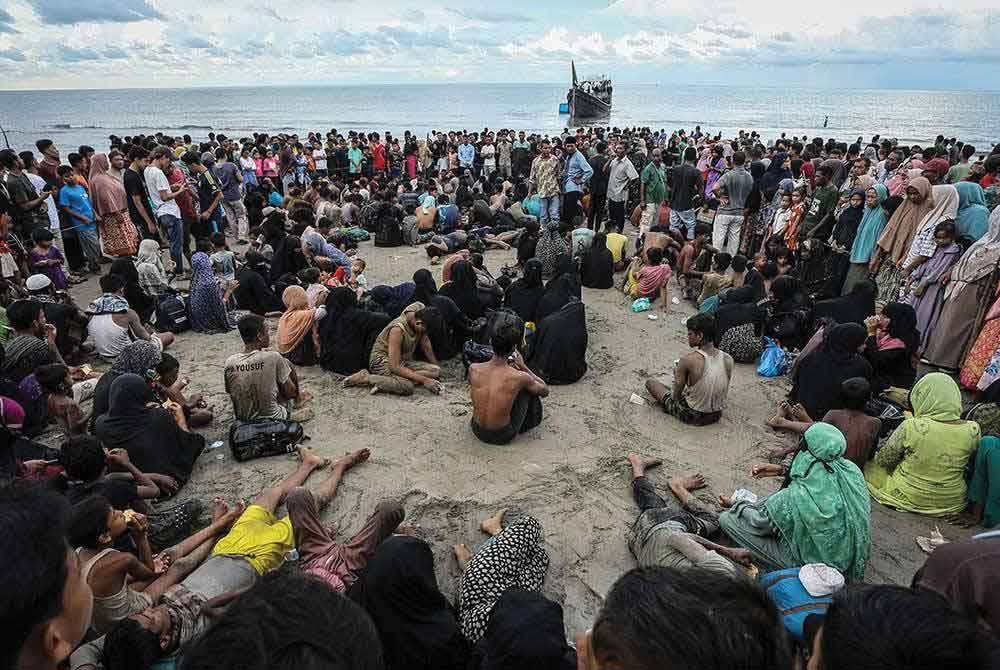Rohingya: 'Malaysia lacks firmness displayed by Indonesia' - Lawyer

SHAH ALAM - It is impossible for Malaysia to take proactive and firm steps in openly rejecting Rohingya refugees as seen in Indonesia because the minority group already has a strong network in the country.
Lawyer Norman Fernandez said that from the United Nations High Commissioner for Refugees (UNHCR) to the ministry level, numerous parties were protecting the interests of Rohingya in Malaysia, preventing anyone from daring to reject the refugee group on a large scale.
"For now, I don't see Malaysia following what is happening in Indonesia.
"The rejection of Rohingya refugees in Aceh is due to their uncivilised behavior, stubbornness, demands for citizenship and unwillingness to respect Indonesian culture and ethics, leading to a local uprising.
"The Indonesian people have also witnessed what happened in Malaysia when this group was widely accepted, causing negative implications for the country.
"Unlike the situation in Indonesia, Malaysians express their dissatisfaction mainly on social media," he told Sinar.
Norman stressed that the presence of human rights organisations and certain religious organisations in Malaysia playing a role in safeguarding the needs of Rohingya would further complicate the chances of repatriating the refugee community to their home country.
"In 1998, the number of Rohingya refugees in Malaysia was 8,000.
"Former prime minister Tun Dr Mahathir Mohamad mentioned the difficulty of repatriating Rohingya refugees.
"Until November 2023, the number of Rohingya refugees in Malaysia has doubled to 107,520.
"With a high birth rate in recent years, Rohingya refugees will change the demographic landscape and it is not impossible for our people to become a minority in our own country.
"What is clear is that no Islamic country in the Organisation of Islamic Cooperation (OIC) is willing to accept Rohingya refugees and provide third-country placement.
"However, Malaysia has made a big mistake by granting asylum to them, becoming a burden to the country and threatening safety and harmony in the community," he said.
Despite the thin likelihood of a massive rejection of Rohingya refugees in Malaysia, Norman said the government should have some firm stances to prevent chaos as seen in Indonesia.
"To avoid unwanted incidents, I suggest the government take bold action by closing and expelling UNHCR from Malaysia.
"Secondly, they need to gather and place all Rohingya in refugee camps, segregating men and women to dilute the intention of Rohingya refugees coming to Malaysia," he said.
Lack of determination
Norman also pointed out that Malaysia lacked determination in taking action or finding a solution to this issue, unlike Indonesia, a unitary Republic that considered their land as 'sacred.'
"The government needs to realise that there are 900,000 Rohingya refugees in camps in Bangladesh.
"They are not persecuted refugees but economic refugees.
"In my opinion, the real mistake lies with the soft approach of the government and a handful of parties that welcomed their arrival in this country.
"The government has failed to show not only firmness but a robust plan to address the Rohingya refugee issue, which has now become a 'permanent population' in Malaysia," he said.
Last week, a large group of Indonesian students stormed a settlement occupied by hundreds of Rohingya refugees from Myanmar in Banda Aceh.
The goal of the massive raid was to demand the repatriation of Rohingya refugees in Aceh to their home country, following increased tension between the local community and the refugee group entering Indonesia in large numbers.
Recently, the arrival of this minority group has been rejected in Indonesia as local residents became increasingly frustrated with the surge in the number of unauthorised boats.
In Malaysia, crimes involving this refugee group were on the rise, with two Rohingya men arrested by the police for allegedly raping a Form Three student in a car before abandoning the victim in a playground in Batu Berendam last September.
Selangor Police Chief Datuk Hussein Omar Khan reportedly mentioned that Rohingya gangs were believed to be behind at least 50 cases of house break-ins and robberies in Selangor, Kuala Lumpur, Melaka, Negeri Sembilan, Pahang and Penang since 2011 until they were successfully crushed by the police on Dec 23.
In a related matter, Malaysian Community Care Foundation (MCCF) chairman Datuk Seri Halim Ishak said Malaysia was in a dilemma in taking strong action against the minority due to the perceived sympathy towards persecuted Rohingya refugees.
"It is highly impossible for this country to reject Rohingya refugees on a large scale because there are many non-governmental organisations (NGOs) advocating for them due to the perceived sympathy towards oppressed Rohingya refugees.
"Because of this, Malaysia is facing various phases with refugees and a flood of foreigners who openly commit many wrongs against this country.
"Malaysia is too compromising on the issue of Rohingya refugees, allowing them to take advantage and commit crimes in this country.
"This country is too compromising on the issue of foreign residents, to the point where Malaysians seem to be 'stepped on' by refugees.
"Most of them have bad behavior, for example, they have kept goats and cows in apartment flats. This has never happened in our society," he said.










